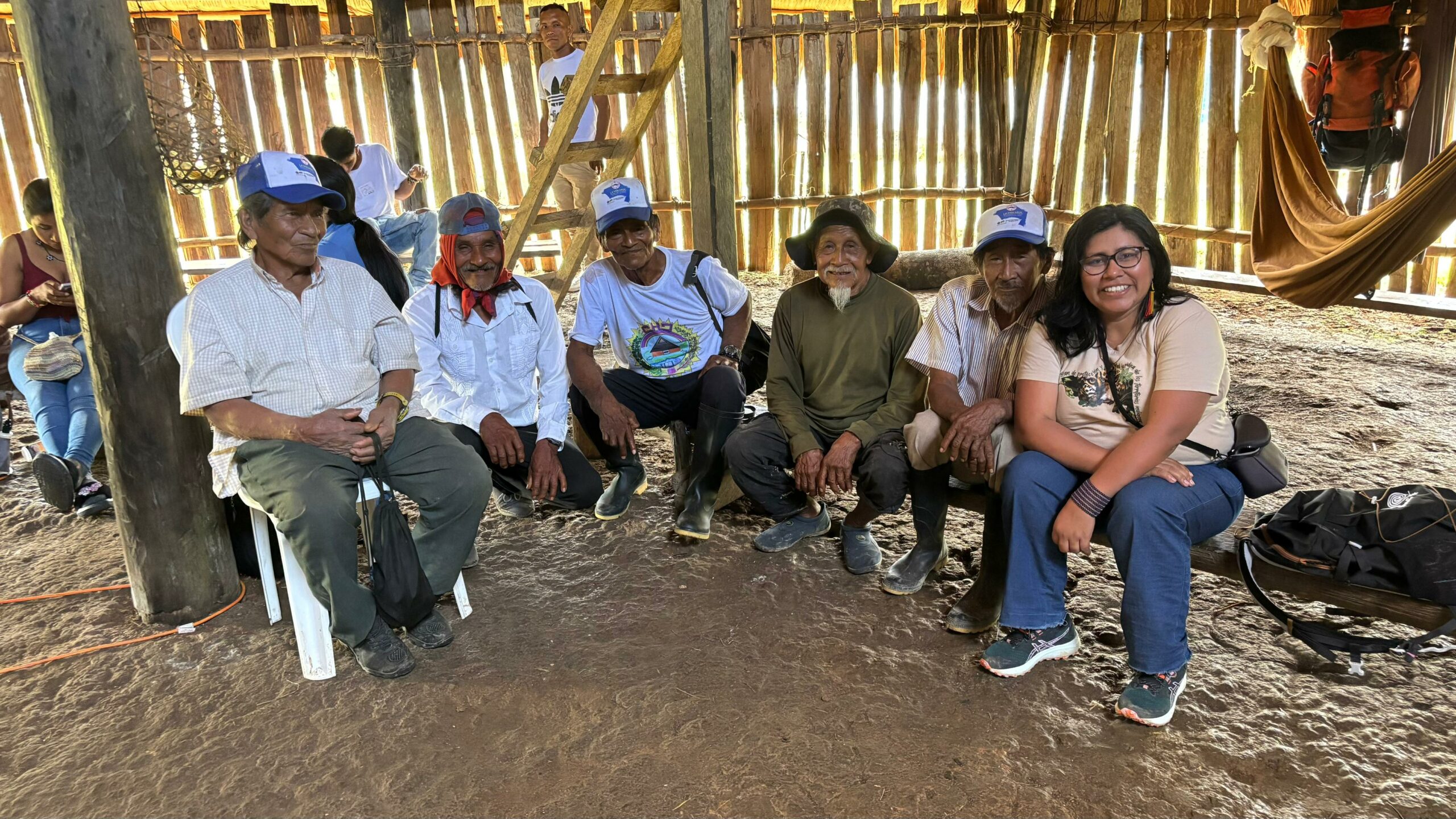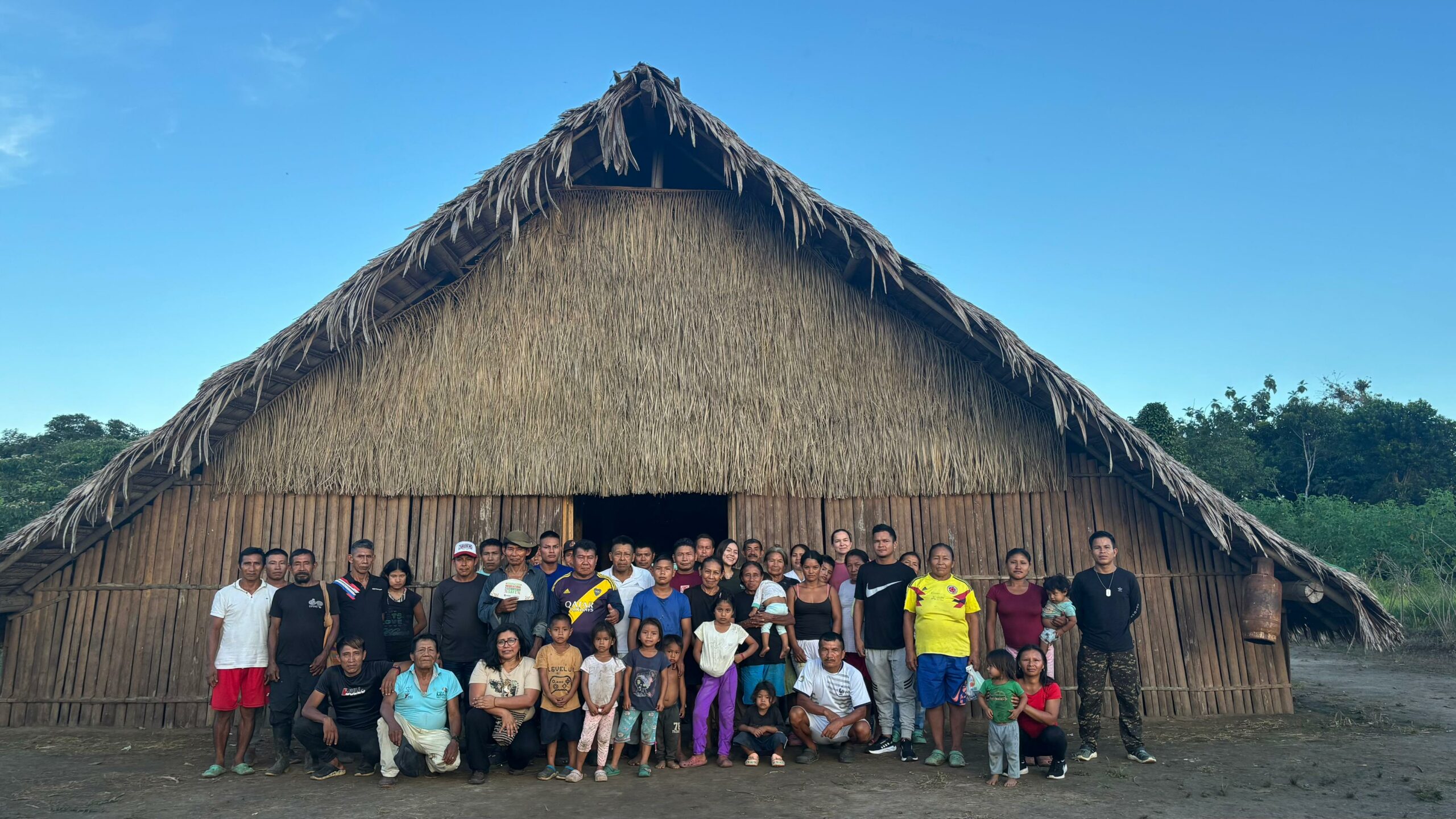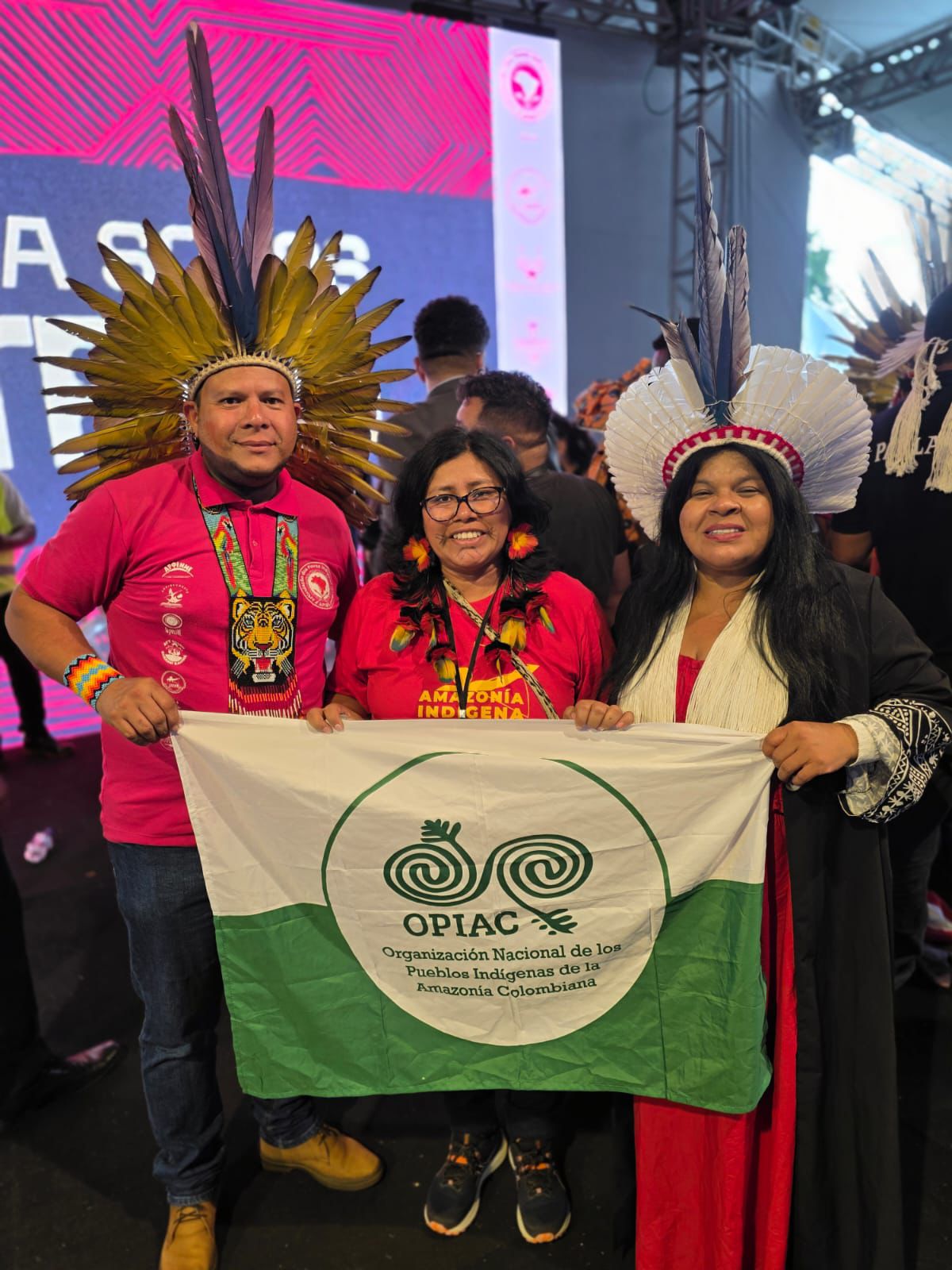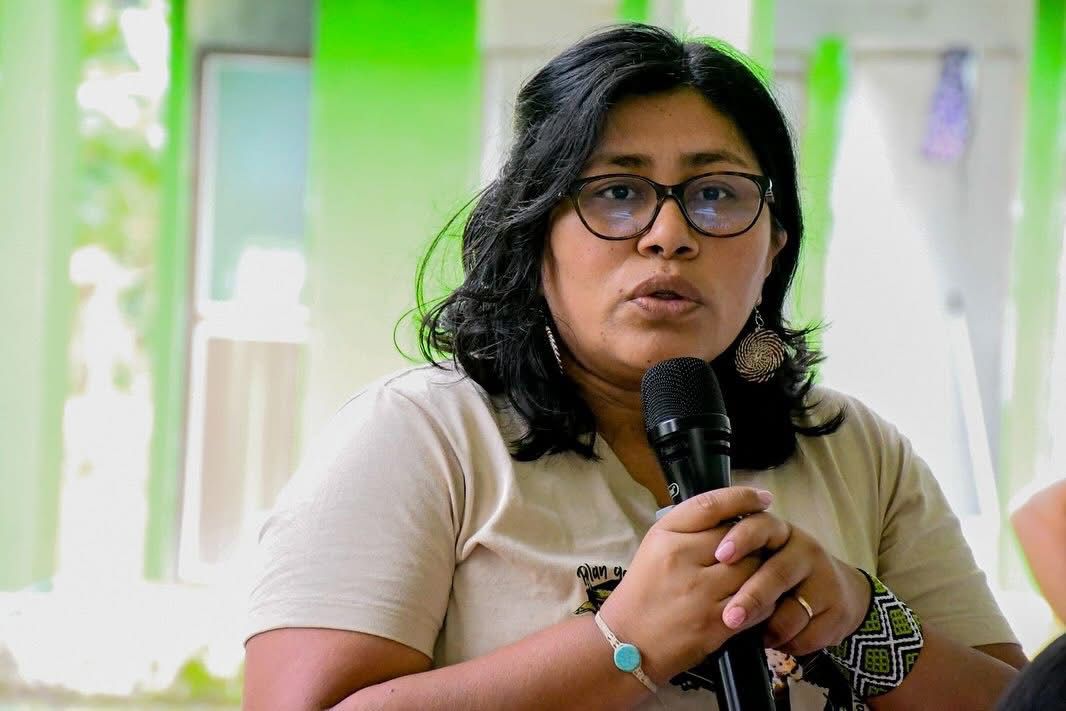2025-09-11
Through the voice of Patricia Suárez, a Murui Indigenous woman, we journey into the Colombian Amazon—a lush, biodiverse rainforest home to 64 Indigenous Peoples, whose territories face multiple threats.
Patricia currently serves as an advisor to the general coordinating body of the National Organisation of Indigenous Peoples of the Colombian Amazon (OPIAC), overseeing varying organisational initiatives.
In a brief five-question interview with our team at Tenure Facility, Patricia shared powerful truths about Indigenous territorial rights in the Amazon and outlined urgent actions to protect them. Her reflections provide vital insights for advocacy in a region of immeasurable importance to biodiversity, climate change mitigation, and ancestral knowledge—not only for Colombia, but for the world.
Here are some highlights from our conversation:

Patricia Suárez visiting an Indigenous community in Colombia
1.To begin, could you tell us about your path in defending the territorial rights of Indigenous Peoples of the Colombian Amazon? How did you start working with OPIAC, and why?
From the start of my career, I have focused on advancing human rights, including more than four years with Colombia’s National Indigenous Organisation (ONIC), where I provided dedicated advice on this issue.
Working for human rights was one of my passions. However, in 2020 the COVID-19 pandemic made me reflect deeply on my commitments and focus. The pandemic hit my family very hard; two of my brothers passed away in May that year. It was devastating—especially being a human rights defender, and yet unable to do anything when my own family needed me most.
That experience led me to reconsider my priorities. I decided to focus on defending the territorial rights of Indigenous Peoples in the Colombian Amazon. Indigenous territories sustain and generate life, yet many still lack a voice or protection.
I chose to focus on ensuring these territories’ security, especially their legal security. In Colombia’s complex context, this safeguard allows us as Indigenous Peoples to continue conserving ecosystems, sustaining our ways of life, protecting biodiversity, and supporting our elders and traditional authorities to live and share their knowledge with the world.
In 2023, while I was rethinking my professional focus, OPIAC President Oswaldo Muca invited me to join the organisation. I began coordinating the “Plan for the Protection and Legal Security of the Indigenous Territories of the Colombian Amazon” project supported by Tenure Facility, which includes three lines of work:
2. Could you give us some context on the territorial rights of Indigenous Peoples in the Colombian Amazon? Why is it so important to protect these peoples and advance their tenure rights?
Colombia’s complex context makes working on Indigenous territorial rights highly challenging. In the Colombian Amazon there are 64 Indigenous Peoples, some of them in voluntary isolation. They all live in territories rich in natural resources, which draw strong interest from many actors in the country. This makes advancing territorial rights extremely difficult.
For example, in the departments of Guaviare, Caquetá, and Putumayo—which are easily accessible by road—we’ve seen agricultural frontier expansion, large-scale infrastructure projects, settlement of non-Indigenous people in Indigenous territories, and land titles issued to outsiders. All these actions threaten Indigenous territories, particularly because these projects and new settlers do not take care of the land.
Working for territorial rights is also complex because engaging with state institutions and decision-makers is very difficult. Land tenure processes are extremely slow, and public officials do not prioritise titling Indigenous territories in the Amazon.
Yet, advancing titling and legal security is vital. As Indigenous Peoples, we bury our umbilical cords in our territories. We carry forward cultural mandates from our ancestors to care for life in all its forms. Our Indigenous reserves in the Amazon are among the country’s best conserved areas. Guaranteeing their legal security is essential. It is necessary—and logical—to protect the place where we live, where we belong, and where we sow life.

Patricia Suárez visiting an Indigenous community in Colombia
3. Can you explain more deeply how Indigenous Peoples protect and care for their territories and biodiversity?
We have a profound relationship with the places we inhabit. There are rules for living in these territories, which we follow. These rules are not imposed by people; they come from nature itself, passed down through our elders from generation to generation.
I’ll give you an example. We didn’t used to have refrigerators in my territory, so our parents would fish for the day’s food. But they didn’t catch 100 fish—they caught only enough to feed us for the day. The same applies to crops: we don’t clear large areas, just small plots to plant what’s necessary.
We take only what we need from the land and the forest: we don’t overhunt or overfish. We allow systems to continuously regenerate. This way of living is an important contribution by Indigenous Peoples to the world.
If you look at maps of the Colombian Amazon, the greenest areas align with Indigenous reserves. That alone shows how we protect and conserve these territories.
We’re also restoring territories that, as our elders say, have been degraded and killed. We know how to recover these territories, which is why we push to expand our reserves. We want to protect not only green forests but also those damaged areas. We do it because life matters, because we know how to care for it, and because we realise the world is approaching a point of no return.
4. Do you think OPIAC and Tenure Facility have helped advance Indigenous territorial rights in the Amazon?
Yes. The OPIAC–Tenure Facility project has been a milestone. It is the first time OPIAC has supported collective titling processes in the Colombian Amazon.
This work not only supports Indigenous communities to apply for and register their collective titles but also strengthens their capacity to manage territorial rights. Having land is not enough; other rights must also be recognised and secured.
As part of this project, OPIAC set a target of assisting 89 Indigenous groups to file applications with the National Land Agency (ANT) to establish or expand their reserves. With strategic partners such as Amazon Conservation Team Colombia, we aim to ensure at least 16 reserves are formally established or expanded.
So far, more than half of these 16 reserves have met the ANT’s main requirements. We are now waiting on minor formalities for the agency to finalise and make official the decisions to establish or expand at least 10 of them.
The project has resulted in several achievements:

Patricia Suárez alongside Kleber Karipuna (APIB) and Brazil’s Minister of Indigenous Peoples, Sonia Guajajara
5. As we approach COP 30, what concrete measures do you think the international community should adopt to promote Indigenous territorial rights in the Amazon?
We’re focusing all our energy on ensuring that COP 30 delivers agreements on territorial rights and that the world better understands who we are as Indigenous Peoples of the Amazon Basin.
This COP will take place in Indigenous territory—something historic. That’s why we’re calling it the “Indigenous COP.” It is a unique opportunity to advance our proposals and to show the world our contributions.
Specifically, we want COP 30 to recognise that conserving and protecting life requires working with and from the Amazon. We need to be able to effectively contribute to plans and strategies to confront the climate crisis. To do so, our governance and knowledge systems must be properly recognised.
We are not opposed to the energy transition. At this COP, we want to participate in these discussions and strategy-making, but the energy transition must be just—meaning that resources for it should not be extracted from the Amazon. We don’t want more mining in our territories.
We are also seeking direct funding for Indigenous Peoples. We have contributed enormously to protecting the Amazon and nature globally. It’s time we are compensated for our work. We can no longer do it alone; our elders cannot continue doing it alone. Direct funding would allow us to realise our life plans and continue contributing to the planet.
At this COP, we want the world to know we’re here in the Amazon, we’re sustaining the planet’s health, and we invite everyone to join our efforts.

Bonus question: Could you tell us about your work on nationally determined contributions (NDCs)? What are your goals for COP 30?
The Colombian government is updating its NDCs, which were due in August. OPIAC has been engaged in this process to ensure key issues are included in the NDCs presented by the government at COP 30.
This hasn’t been easy. We believe there is a double discourse from the government: on the one hand, it publicly commits to supporting Indigenous conservation efforts. On the other hand, in practice, our recommendations are not meaningfully included in the NDC documents.
We have been working with the government on the following proposals:
In short: we are calling for climate justice. Without territorial justice, there is no climate future. Without Indigenous Peoples, there is no living Amazon.
Thanks for reading our interview. We are grateful to Patricia Suárez for sharing her story and for her leadership in defending Indigenous territories.
Articles